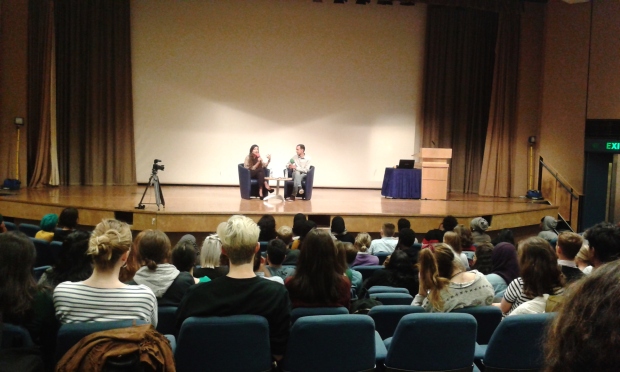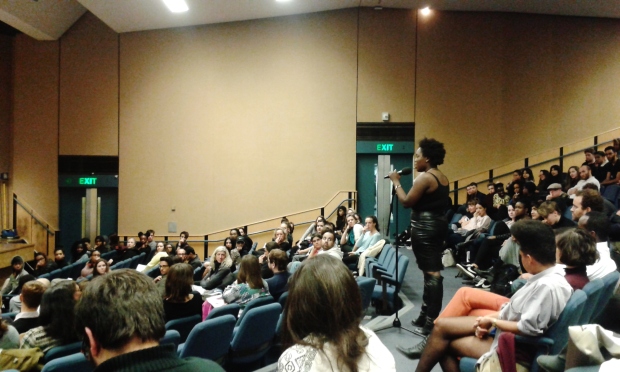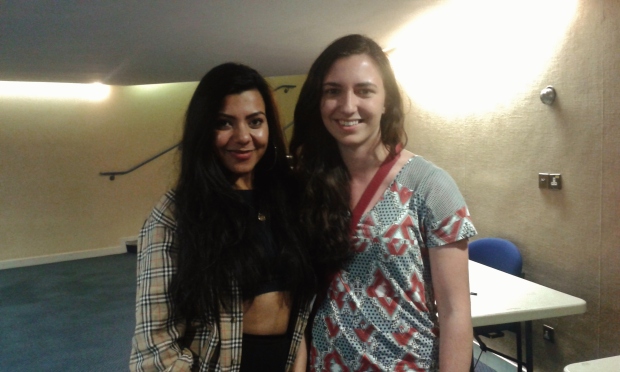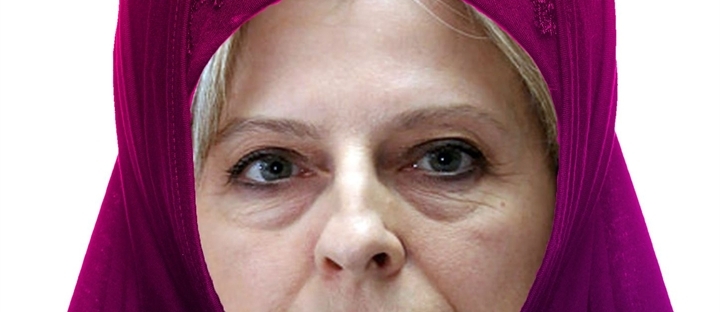WARNING: Essay alert! When faced with no word limit, words pour out!
Freelance journalist Kieran Yates is intelligent, articulate, witty, opinionated…and brown. Not that the last part should matter in a supposedly multi-cultural 21st century Britain. British values, as characterised by OFSTED, include the rule of law, a system of democracy, individual freedom of speech and expression as well as respect and tolerance of others. But for Kieran, the meaning of the term is much more sinister than one would expect.
I went to her talk aptly titled “What The F*** Are British Values?” at the School of Oriental and African Studies (SOAS) in London to learn more about her views on the concept and whether or not these values could be redefined to better reflect our society. Kieran was joined in conversation by fellow journalist Rahul Verma, who she has known for 5-6 years. What began as a professional relationship in a mentor-mentee capacity blossomed into a friendship, as they found common ground when gossiping about being in the “brown journalist” minority group.

The event began with a chat between Kieran and Rahul, which was then opened up to the audience, as people voiced their opinions and asked a series of questions. Reference was made to Prime Minister David Cameron’s speech on the meaning of British Values that was outlined in an OFSTED report. In contrast to Cameron’s idea of tolerance and acceptance, Kieran believes that it is simply a way for the government to respond to the thriving black, minority and ethnic (BAME) communities in the UK which are represented as a growing threat to the powerful minority’s representation of how Britain should be, following years of colonial rule.
Where did the term “British values” originate? Rahul said that it was in 2005, when Tony Blair spoke about a lack of integration in the aftermath of the 7/7 bombings. Kieran also mentioned David Cameron’s 5 year plan in which he outlined the “issue of radicalisation” which, as Kieran described, had the aim of “instilling a sense of what it means to be British in schools”. She also talked about her own cultural identity, growing up in Britain as a Punjabi, and the pressure members of her community faced by having to constantly prove their economic contribution. In Kieran’s eyes, the danger with Cameron’s rhetoric is that fearmongering is disguised as pledging allegiance to British values. Perhaps British values are actually a “tool to divide people” added Rahul. This was said in the context of Nigel Farage’s speech in which he said that the EU is “mad” to accept so many refugees into Europe that have shifted the conversation to the threat of refugees. Rahul believes this is having a sinister impact on our everyday lives, particularly in schools, where British values are now part of the national curriculum.
What was Kieran’s response? To take to Twitter and launch her own zine (an online magazine) to voice her passionate beliefs, which she named British Values. One of the features championed pop star Zayn Malik as a “page 3 heartthrob” as he was, in her words, the “only cool capital attached to being brown”. She also shared her frustrations when pitching story ideas as a journalist, wanting to promote stories about people of colour. Her editors would reject and dismiss her ideas one by one. Getting rejected didn’t make her angry, but highly emotional. She decided to channel these feelings into a personal DIY journalism project. Living by so-called “british values”, Kieran argued, could only create a “divisive culture”. Instead, she wanted to bring a diverse range of contributors together and combine their stories into her British Values zine which now sits proudly on the webisphere (as well as in print copy). In doing so, she has successfully channelled her emotions into something that is both interesting and important.
A snippet from BBC satire Goodness Gracious Me
The TV show Goodness Gracious Me, famed for its satirical jokes that “even white people got”, turned out to be a huge influence on Kieran’s work. For instance, some sketches would feature a “token white person” to make a point about diversity, and how the situation is viewed differently when racial identities are swapped. For Kieran, comedy was a powerful way to overcome those initial feelings of rejection and despair she must have been experiencing.
She even poked fun at the “pop up” restaurant culture in this country, something I had never thought twice about. The idea that food from immigrant communities just “popped up” and is a novelty on the food scene, a temporary fad, is “laughable” to her.
When Kieran began this journalistic venture, she didn’t know exactly what her features and regulars would consist of and how they would come to life. She would commission ideas, her contributors would write them and then send them back to her to edit. She used her savings to set it all up, and everyone worked on the zine for free. “It was a labour of love” she recalled. She even managed to secure advertising, and made it her mission to only include brands that she really liked. One of them was Jolene, a hair bleaching company, another was an Asian restaurant in London. She also expressed an interest in getting a basmati rice company on board in the future, as well as a grime music label called Butterz and Radar Radio.
Although a labour of love, Kieran saw the zine’s potential to fill a gap as it was “a great opportunity to engage in difference”. She converted her zine into print versions, producing 300 copies (typos included). They sold out, and she had another batch created. But, in a culture of increasing censorship, Kieran was concerned that her zine could get into trouble (for example, if an advert for Tayyabs Restaurant was juxtaposed with the story of an Asian sex worker, it may not go down terribly well). Some of the feedback she received about her zine was that those living in Desi homes loved it…but couldn’t read it in front of their parents!

A message Kieran was keen to get across to her readers is that there is no excuse not to have more ethnic minority writers, be they Muslim, Sikh, Asian, West African or otherwise. The media needs to work harder to give these people a voice, she insists. Her zine was previewed in The Guardian and slowly made its way into mainstream media. If her (or other ethnic) voices are presented at all, they are not done so “with plurality or nuance”. To them, her ideas are described as “too niche”. She’s working on her next issue now, and Rahul asked where her inspiration came from. Kieran had worked on a Guardian documentary called Muslim Drag Queens. She had established friendships with a number of queens and club owners and, when she pitched her ideas to The Guardian, they loved it. They then got a director on board who was hand-picked specially for this project. That was when it all seemed to go downhill for Kieran. The only people who were involved in the process of transforming The Guardian’s short doc into a long-form piece for Channel 4 were, alarmingly, all white males. What’s worst is that they were making this new documentary without her, giving a mere “with thanks” credit when she protested against it through a formal email.
At first, Kieran was concerned that speaking out about this would be damaging to her professional relationships. But, as an activity, she felt she had to be bold and write about the “fuckery”going on around her. The next step was to create to platform on which to voice these opinions. She received no apology from Channel 4 for the incident, who said that they had not heard about her involvement in the production. Nevertheless, it was the online solidarity that left her feeling united with others that wanted justice for Kieran and others who felt they had experienced racial and sexual discrimination. Kieran admitted that her experience was far from unique. I was just one of thousands of examples of similar incidents, not simply one throwaway experience: “there is a real denial of women of colour in the media, but it’s done in a very subtle way”. This is also know as micro aggressions, whereby Kieran’s ideas would be sidelined by her superiors while, for writers such as Katie Hopkins, editors would allow them to go so close to the line of acceptable commentary.
Would she have established the zine if it wasn’t for the Channel 4 saga? Perhaps, but it wouldn’t have been in the same way. The rage she felt at the Channel 4 situation was a key “catalyst for change” as she set about turning her rejection on its head. Now, she identifies herself a culture journalist, who celebrates diverse stories and communities.
But, moving forward, should we conform to British values or confront them, asked Rahul. Kieran began to wrap up the talk by saying that an “abstract” concept of British values is “dangerous” because it can be used to encourage fear-mongering. British values, and the culture surrounding is, is a concept that “we don’t fully understand”. Yet it is being reflected in policy changes. For instance, £45 million is being cut from adult education (namely ESOL, which provides lessons for students of English as a foreign language).
Ultimately, as Kieran and Rahul point out, there hasn’t be a comprehensive political debate in the 21st century regarding British values and the wider implications of introducing such a term. Those in power are seen not wanting to discuss British values, and what Britishness actually entails, because it can then be undermined. But that didn’t stop people debating and questioning it in the audience at the event, from a mixed race girl whose perceived appearance as a “white” woman gave her unequal privilege, to a young white mann urging people from diverse backgrounds to get in touch with him, as his “very white, middle-class” group of writers was far from the working environment he had hoped for! After the event, I even ended up in McDonald’s discussing some of the issues Kieran’s talk raised with a few girls that I met there.

I would like to give thanks to Kieran, Rahul and everyone at SOAS and beyond for organising an interesting and insightful discussion surrounding British values and long may the discussion continue, at least until there is considerable change in people’s attitudes and behaviours towards BAME journalists and their voices. Kieran’s zine is a great start, but it seems we’ve still got a long way to go.
You can buy copies of Kieran Yate’s zine online at: britishvalues.bigcartel.com


Reblogged this on Savan Gandecha's Blog and commented:
Interesting blog.
LikeLike